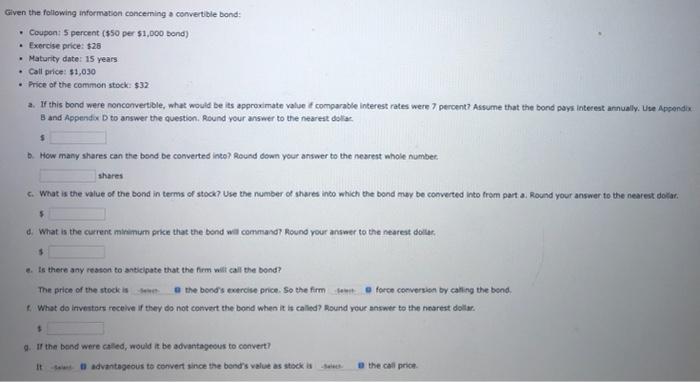Answered step by step
Verified Expert Solution
Question
1 Approved Answer
Given the following information concerning a convertible bond: Coupon: 5 percent ($50 per $1,000 bond) Exercise price: $28 Maturity date: 15 years Call price: $1,030

Given the following information concerning a convertible bond:
Given the following information concerning a convertible bond: Coupon: 5 percent ($50 per $1,000 bond) Exercise price: $25 . Maturity date: 15 years Call price: $1,030 Price of the common stock: $32 2. If this bond were nonconvertible, what would be its approximate value if comparable interest rates were 7 percent? Assume that the bond pays interest annually. Use Appendix B and Appendix D to answer the question. Round your answer to the nearest do 5 D. How many shares can the bond be converted into Round down your answer to the nearest whole numbet. shares c. What is the value of the bond in terms of stock? Use the number of shares into which the bond may be converted into from part a. Round your answer to the nearest dollar, 5 a. What is the current minimum price that the bond will command? Round your answer to the nearest dollar $ ..ts there any reason to anticipate that the firm will call the bond? The price of the stocks the bond's exercise price. So the firm sem force conversion by calling the bond. What do investors receive if they do not convert the bond when it is called? Round your answer to the nearest dollar a. Ir the band were called, would it be advantageous to convert? Ito advantageous to convert since the band's value as stock is see the call price Coupon: 5 percent ($50 per $1,000 bond)
Exercise price: $28
Maturity date: 15 years
Call price: $1,030
Price of the common stock: $32
a. If this bond were nonconvertible, what would be its approximate value if comparable interest rates were 7 percent? Assume that the bond pays interest annually. Use Appendix B and Appendix D to answer the question. Round your answer to the nearest dollar.
b. How many shares can the bond be converted into? Round down your answer to the nearest whole number.
c. What is the value of the bond in terms of stock? Use the number of shares into which the bond may be converted into from part a. Round your answer to the nearest dollar.
d. What is the current minimum price that the bond will command? Round your answer to the nearest dollar.
e. Is there any reason to anticipate that the firm will call the bond?
The price of the stock is _____the bond's exercise price. So the firm ______force conversion by calling the bond.
f. What do investors receive if they do not convert the bond when it is called? Round your answer to the nearest dollar.
g. If the bond were called, would it be advantageous to convert?
It ______advantageous to convert since the bond's value as stock is _____the call price.
Step by Step Solution
There are 3 Steps involved in it
Step: 1

Get Instant Access to Expert-Tailored Solutions
See step-by-step solutions with expert insights and AI powered tools for academic success
Step: 2

Step: 3

Ace Your Homework with AI
Get the answers you need in no time with our AI-driven, step-by-step assistance
Get Started


